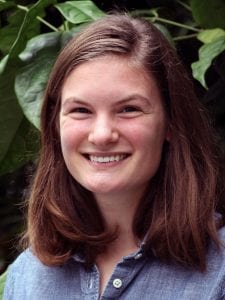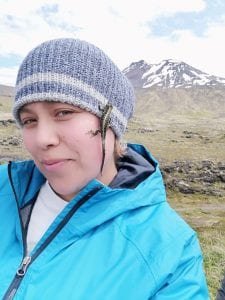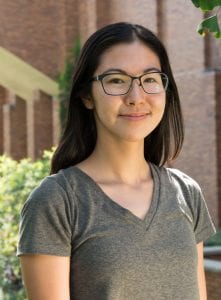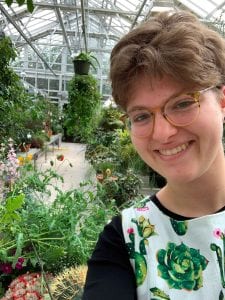-Magdalen Lindeberg
Weed management for perennial grains, ecological niche modeling of a California lily, identification of resistance loci for tomato early blight– these are a few of the diverse graduate student projects recently funded through the Schmittau-Novak Small Grants Program. Supported by a bequest from the estate of Jean Schmittau in honor of Joseph Novak, Plant Biology Professor Emeritus, the Schmittau-Novak Small Grants Program is designed to provide graduate students in the School of Integrative Plant Science with the opportunity to experience the process of writing and reviewing proposals, and implementing a research plan of their own design.
Proposals for the spring 2019 were due on February 22 and reviewed in late March by a panel drawn from SIPS graduate students receiving Schmittau-Novak funding in the previous round. Seven proposals were selected for funding with awards ranging from $4,954 to $9,940. The program is directed by Dan Buckley and Teresa Pawlowska.
Uncovering the Past and Predicting the Future: Applying Comparative Genomics to Early Blight Resistance in Tomato

 Martha Sudermann is a Plant Pathology PhD candidate advised by Chris Smart. Her research focuses on population diversity studies of the late blight pathogen Phytophthora infestans and the the fungal pathogen Passlora fulva, which causes tomato leaf mold. Taylor Anderson is a Plant Breeding PhD candidate in the Mutschler program, using quantitative genetic principles and molecular markers to develop tomato cultivars that can better withstand the challenging growing conditions and disease pressure of the Northeast U.S. Martha and Taylor will be using whole-genome sequencing and computational phylogenetic inference to reconstruct the history of early blight resistance breeding in tomato to gain insight into the putative resistance mechanisms. Tomatoes important to EB resistance breeding will be sequenced with the goal of (i) reconstructing breeding pedigrees and identifying sources of EB resistance introgressions, (ii) refining the genomic locations of our previously-identified early blight resistance loci, (iii) applying this knowledge to the prediction of early blight resistance/susceptibility in hundreds of cultivated and wild tomato accessions.
Martha Sudermann is a Plant Pathology PhD candidate advised by Chris Smart. Her research focuses on population diversity studies of the late blight pathogen Phytophthora infestans and the the fungal pathogen Passlora fulva, which causes tomato leaf mold. Taylor Anderson is a Plant Breeding PhD candidate in the Mutschler program, using quantitative genetic principles and molecular markers to develop tomato cultivars that can better withstand the challenging growing conditions and disease pressure of the Northeast U.S. Martha and Taylor will be using whole-genome sequencing and computational phylogenetic inference to reconstruct the history of early blight resistance breeding in tomato to gain insight into the putative resistance mechanisms. Tomatoes important to EB resistance breeding will be sequenced with the goal of (i) reconstructing breeding pedigrees and identifying sources of EB resistance introgressions, (ii) refining the genomic locations of our previously-identified early blight resistance loci, (iii) applying this knowledge to the prediction of early blight resistance/susceptibility in hundreds of cultivated and wild tomato accessions.
Award amount: $9,941
Revealing the Evolutionary History and Ecological Niches of a Highly Polymorphic Lily, Calochortus venustus: An Investigative Approach to Conservation
 Adriana Hernandez is a Plant Biology PhD student in the Specht lab. She will be using a combined population genetic (RAD-Seq), phylogeographic, and ecological niche modeling approach to evaluate if unique phenotypes for a polymorphic California endemic lily are spatially delimited by genetic factors such as fixed population structure, climatic variables such as precipitation, or a combination of both. Findings may be used to: propose conservation management plans for C. venustus populations, serve as a foundation for understanding how populations of C. venustus and ecologically similar species may respond to climate change and how polymorphic traits may be best maintained across the California landscape.
Adriana Hernandez is a Plant Biology PhD student in the Specht lab. She will be using a combined population genetic (RAD-Seq), phylogeographic, and ecological niche modeling approach to evaluate if unique phenotypes for a polymorphic California endemic lily are spatially delimited by genetic factors such as fixed population structure, climatic variables such as precipitation, or a combination of both. Findings may be used to: propose conservation management plans for C. venustus populations, serve as a foundation for understanding how populations of C. venustus and ecologically similar species may respond to climate change and how polymorphic traits may be best maintained across the California landscape.
Award amount: $5,000
Investigating the potential of soil microbiomes from fallow agricultural fields to improve the pest resistance of crops
 Mia Howard is a Plant Biology PhD candidate studying the chemical ecology of plant-microbe-insect interactions in André Kessler’s lab. Her research has focused on how soil microbes can affect the resistance the native plant tall goldenrod, Solidago altissima, to insect herbivores. Howard will be working with an undergraduate mentee to evaluate whether microbe-mediated herbivore resistance phenotype previously observed with S. altissima can be applied to improve the pest resistance of crop species. Tomato and maize will be inoculated with soil microbiomes from fields that have been fallow for 0 to 15 years and the effects of these different microbiomes on herbivore resistance assessed.
Mia Howard is a Plant Biology PhD candidate studying the chemical ecology of plant-microbe-insect interactions in André Kessler’s lab. Her research has focused on how soil microbes can affect the resistance the native plant tall goldenrod, Solidago altissima, to insect herbivores. Howard will be working with an undergraduate mentee to evaluate whether microbe-mediated herbivore resistance phenotype previously observed with S. altissima can be applied to improve the pest resistance of crop species. Tomato and maize will be inoculated with soil microbiomes from fields that have been fallow for 0 to 15 years and the effects of these different microbiomes on herbivore resistance assessed.
Award amount: $ 8,443
Sticking It to the Monarchs: Which Latex Compounds Cause Butterfly Mortality? Characterization of Intraspecific Variation in Asclepias syrica Isoprenoids
 Arielle Johnson is a Plant Biology PhD student in the Jander Lab. She is interested in how plants make, store, and deploy potent chemical defenses against insect herbivores. Her research focuses on common milkweed latex and its interactions with monarch butterflies. Her Schmittau-Novak award will allow her to start a cross-departmental collaboration with French National Center for Scientific Research group leader Christophe Duplais quantifying variation in latex chemistry and linking specific latex components to delays in monarch caterpillar growth.
Arielle Johnson is a Plant Biology PhD student in the Jander Lab. She is interested in how plants make, store, and deploy potent chemical defenses against insect herbivores. Her research focuses on common milkweed latex and its interactions with monarch butterflies. Her Schmittau-Novak award will allow her to start a cross-departmental collaboration with French National Center for Scientific Research group leader Christophe Duplais quantifying variation in latex chemistry and linking specific latex components to delays in monarch caterpillar growth.
Award amount: $4,953
Investigating weed control tactics in the perinnial grain crops ‘Kernza’ intermediate wheatgras (Thinopyrum intermedium) and ‘ACE-1’ perennial cereal rye (Secale cereale)
 Eugene Law is a PhD candidate in the section of Soil and Crop Sciences advised by Toni DiTommaso and Matt Ryan. His PhD research examines the development of perennial small grain cropping systems by integrating aspects of agronomy, weed and disease management, soil science, sustainability analysis, and economics to better understand system dynamics. Eugene will be working with and mentoring Matthew Spoth, an Agricultural Sciences undergraduate, to investigate the impacts of timing on post-harvest weed management and evaluate preliminary herbicide tolerance for two perennial grain varieties that are undergoing evaluation for potential production in New York.
Eugene Law is a PhD candidate in the section of Soil and Crop Sciences advised by Toni DiTommaso and Matt Ryan. His PhD research examines the development of perennial small grain cropping systems by integrating aspects of agronomy, weed and disease management, soil science, sustainability analysis, and economics to better understand system dynamics. Eugene will be working with and mentoring Matthew Spoth, an Agricultural Sciences undergraduate, to investigate the impacts of timing on post-harvest weed management and evaluate preliminary herbicide tolerance for two perennial grain varieties that are undergoing evaluation for potential production in New York.
Award amount: $8,787
When flowers play dead: floral microbial communities as the source of brood-site deceptive floral scent in the common pawpaw Asimina triloba

 Cassandra Wattenburger is a PhD student in Soil Science, advised by Dan Buckley. She works on the soil microbiome, appreciation of which was initially spurred by her grandfather’s fertilizer business. Kyle Martin in a PhD student in Plant Biology, advised by Rob Raguso.
Cassandra Wattenburger is a PhD student in Soil Science, advised by Dan Buckley. She works on the soil microbiome, appreciation of which was initially spurred by her grandfather’s fertilizer business. Kyle Martin in a PhD student in Plant Biology, advised by Rob Raguso.
Award amount: $8,511
Citrus Phloem-protein Bodies Target for Bacterial Resistance
 Michelle Laterrade is a PhD student in Plant Biology, working in the program of Bob Turgeon. Her thesis work is focused on the ultrastructural mechanisms modulating phloem transport, with emphasis on healthy and infected citrus sieve elements. Michelle will employ a variety of ultra-structural, molecular, and genomic approaches to characterize citrus phloem-protein bodies in their native state. The results of this project will commence in the overall aim of her thesis, in which is to develop viable citrus cultivars with modified Phloem-protein bodies that will enmesh and trap bacteria in the phloem.
Michelle Laterrade is a PhD student in Plant Biology, working in the program of Bob Turgeon. Her thesis work is focused on the ultrastructural mechanisms modulating phloem transport, with emphasis on healthy and infected citrus sieve elements. Michelle will employ a variety of ultra-structural, molecular, and genomic approaches to characterize citrus phloem-protein bodies in their native state. The results of this project will commence in the overall aim of her thesis, in which is to develop viable citrus cultivars with modified Phloem-protein bodies that will enmesh and trap bacteria in the phloem.
Award amount: $4,976
